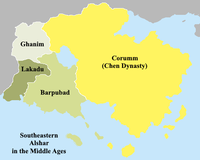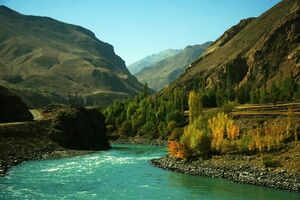Rusana
Republic of Jalqolak نوتستان من رو بخور | |
|---|---|
|
Flag | |
| Capital and largest city | Tabish |
| Ethnic groups |
|
| Demonym(s) | Jalqolaki |
| Government | Unitary semi-presidential constitutional republic |
• Chief of State | Afsar Gorshani |
| Legislature | National Assembly |
| Establishment | |
• ?? | ???? |
• ?? | ???? |
• ?? | ???? |
• ?? | ???? |
| Area | |
• Total | 794,582 km2 (306,790 sq mi) |
| Population | |
• 2020 estimate | 54,650,440 |
• Density | 69/km2 (178.7/sq mi) |
| Currency | Paric (??) |
| Time zone | UTC?? |
| Driving side | left |
Jalqolak
The Republic of Jalqolak is a sovereign state located in southern Alshar. Jalqolak has a land area of 794,582 km2 and is bordered by Corumm to the east, Kulaparkar to the north, Dhavastu to the west and the Taizi Sea to the south. The population of Jalqolak is split almost evenly between urban and rural areas, with the capital city of Tabish being the undisputed center of economic activity. Jalqolak has seen human habitation for thousands of years and has been a battleground for several regional powers including the Oduniyyad caliphate and various Corummese dynasties. Its population is composed of a Jalqolaki majority and various minorities such as the Tauqi and Kassar people and Corummese muslims known as Yue.
Contents
History
Kingdoms of Ghanim, Lakadu, and Barpubad

Chen-Jalqolak Wars
Corumm#Chen-Jalqolak_Wars Following the Chen-Jalqolak Wars Ghanim fell into the sphere of the Chen dynasty.
Early Modern Period
Levantine Colonization
1650-1798 Kiravian explorers were the first "occidentals" to make contact with the peoples of modern Jalqolak however from their introduction in the 1500s to the establishment of the Martillian Protectorate over the Kingdom of Lakadu it was often overlooked compared to the riches of Corumm. The Ularien Trading Company of Martilles first established contact with the Kingdom of Lakadu in 1616. With Kiravs well established trade with Corumm for far eastern goods the Martilliens negotiated a treaty with the , the Burgundian Ularien Trading Company in 1705.
20th century
First Corummese Invasion
Second Corummese Invasion
Kushim Event
Third Corummese Invasion
Geography

The climate of Jalqolak varies from tropical to temperate, with semi-arid conditions in the coastal south. There is a monsoon season with frequent flooding due to heavy rainfall, and a dry season with significantly less rainfall. There are four distinct seasons in Jalqolak: a cool, dry winter from December through February; a hot, dry spring from March through May; the summer rainy season, or southwest monsoon period, from June through September; and the retreating monsoon period of October and November. Rainfall can vary greatly from year to year, and patterns of alternate flooding and drought are not uncommon.
Politics
| Leader | Party | Seats |
| Afsar Gorshani | Jalqolak Jamaat-e-Islami (Alliance for Prosperity) | 105 |
| Marjan Abidi | Movement for Islamic Renewal (Alliance for Prosperity) | 40 |
| Qadir Bhatti | Islamic Call Party (Alliance for Prosperity) | 35 |
| Mirwais Baqri | Ummah Party (Alliance for Prosperity) | 5 |
| Rostam Khosa | Jalqolak Patriotic Alliance (Builder's Alliance) | 85 |
| Semu Taqvi | Movement For Progress (Builder's Alliance) | 21 |
| Babar Gasul | Kassar Front (Builder's Alliance) | 9 |
Jalqolak follows the traditional republican system with three separate branches; an executive led by a Chief of State, an unicameral legislative and the judiciary represented by the Supreme Islamic Court. The Chief of State is elected through nationwide elections, every five years and has wide powers over military, economic affairs and foreign policy. Legislative power rests with the Jalqolaki National Assembly or Jalqolaki Majles, with each of the country's 150 districts having two seats, renewed by election every three years.
Current Jalqolak politics are divided between two electoral alliances, the conservative Alliance for Prosperity and the relatively moderate Builder's Alliance
Society & Culture
Ethnic Groups
wip
Culture
wip
Economy
pomegranates and sand
